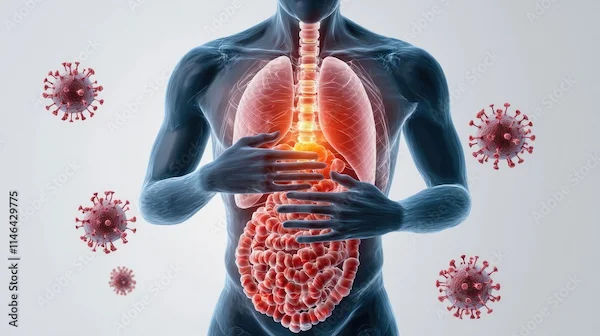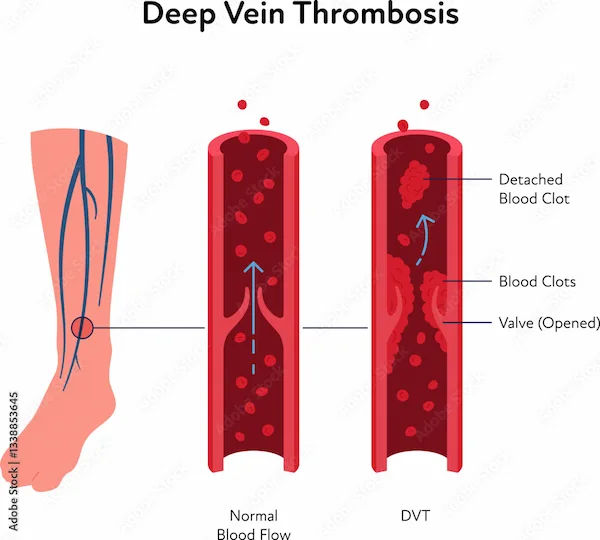Norovirus Symptoms and Causes
Norovirus causes sudden vomiting, diarrhea, and stomach pain. Learn about its symptoms, how it spreads, and effective prevention and home care tips to protect yourself and your family.

Written by Dr. J T Hema Pratima
Reviewed by Dr. D Bhanu Prakash MBBS, AFIH, Advanced certificate in critical care medicine, Fellowship in critical care medicine
Last updated on 24th Jul, 2025

Norovirus is a highly contagious virus that causes stomach and intestinal inflammation, leading to what is commonly known as the "stomach flu." While it can be unpleasant, most people recover within a few days. However, it’s important to recognize the symptoms, understand how it spreads, and take steps to prevent infection; especially for young children, older adults, and those with weakened immune systems.
What is Norovirus?
Norovirus is a common viral infection that affects the stomach and intestines, causing gastroenteritis (inflammation of the digestive tract). It spreads easily through contaminated food, water, surfaces, or close contact with an infected person. Outbreaks often occur in crowded places like schools, nursing homes, and cruise ships.
Common Symptoms of Norovirus
Symptoms usually appear 12 to 48 hours after exposure and can last for 1 to 3 days. The most common signs include:
Nausea and vomiting (often sudden and severe)
Watery diarrhea (without blood)
Stomach cramps and pain
Low-grade fever or chills
Headache and body aches
Fatigue
In severe cases, dehydration can occur, especially in young children, older adults, or people with chronic illnesses. Signs of dehydration include:
Dry mouth and throat
Dizziness or lightheadedness
Decreased urination
Extreme weakness
If these symptoms persist, medical attention may be needed.
How Does Norovirus Spread?
Norovirus spreads very easily through:
1. Contaminated Food & Water: Eating raw or undercooked shellfish, unwashed fruits/vegetables, or food handled by an infected person.
2. Direct Contact: Touching surfaces (doorknobs, countertops) contaminated with the virus and then touching your mouth, nose, or eyes.
3. Person-to-Person Contact: Close contact with someone who is infected, especially in shared living spaces.
4. Airborne Particles: When an infected person vomits, tiny virus particles can spread in the air and infect others nearby.
The virus can survive on surfaces for days or even weeks, making proper hygiene essential.
How to Manage Norovirus at Home
Since there is no specific treatment for norovirus, recovery mainly involves rest and hydration. Here’s what you can do:
Stay Hydrated: Sip small amounts of water, oral rehydration solutions (ORS), or clear broths to replace lost fluids. Avoid sugary drinks or alcohol.
Eat Light: Stick to bland foods like bananas, rice, applesauce, and toast (BRAT diet) once vomiting stops.
Rest: Allow your body to recover by getting plenty of rest.
Avoid Spreading It: Stay home until at least 48 hours after symptoms stop to prevent infecting others.
Consult a specialist for Personalised Advice
When to See a Doctor
Most cases resolve on their own, but seek medical help if:
Symptoms last more than 3 days
There’s blood in vomit or stool
Severe dehydration occurs (dizziness, confusion, no urination for 8+ hours)
A high fever (above 102°F/39°C) develops
If you or a loved one is at high risk (infants, elderly, or immunocompromised), consult a doctor early to prevent complications.
Preventing Norovirus Infection
Since norovirus spreads quickly, prevention is key:
Wash Hands Frequently: Use soap and warm water for at least 20 seconds, especially after using the bathroom, changing diapers, or before eating.
Disinfect Surfaces: Clean contaminated areas with a bleach-based cleaner (norovirus is resistant to many common disinfectants).
Handle Food Safely: Wash fruits/vegetables thoroughly, cook seafood properly, and avoid preparing food if you’re sick.
Avoid Close Contact: Stay away from infected individuals and don’t share utensils or towels.
Wash Laundry Carefully: Use hot water for clothes or linens that may be contaminated.
Conclusion
Norovirus is unpleasant but usually short-lived. By recognizing the symptoms early, staying hydrated, and practicing good hygiene, you can recover faster and prevent spreading it to others. If symptoms worsen or persist, don’t hesitate to seek medical advice.
For personalized guidance, you can consult a doctor online or schedule a lab test through Apollo 24|7 for quick and reliable healthcare support. Stay safe and take care!
Would you like help finding a doctor or booking a test? Let us know; we’re here to help!
Consult a specialist for Personalised Advice
Consult a specialist for Personalised Advice

Dr. Liritha C
General Physician/ Internal Medicine Specialist
5 Years • MBBS, MD (GENERAL MEDICINE)
Hyderabad
Apollo 24|7 Clinic, Hyderabad

Dr. Lakshmi Sanjitha Kakani
General Physician/ Internal Medicine Specialist
6 Years • MBBS, MD (General Medicine)
Visakhapatnam
Apollo 24|7 Clinic - Andhra Pradesh, Visakhapatnam

Dr. Vasanthasree Nair
General Practitioner
15 Years • MBBS
Angamaly
Apollo 24|7 Clinic - Kerala, Angamaly
(425+ Patients)

Dr. Siri Nallapu
General Practitioner
5 Years • MBBS
Hyderabad
Apollo 24|7 Clinic, Hyderabad

Dr. J T Hema Pratima
General Practitioner
9 Years • MBBS
Chennai
Apollo 24|7 Clinic - Tamilnadu, Chennai
(250+ Patients)


.webp)

